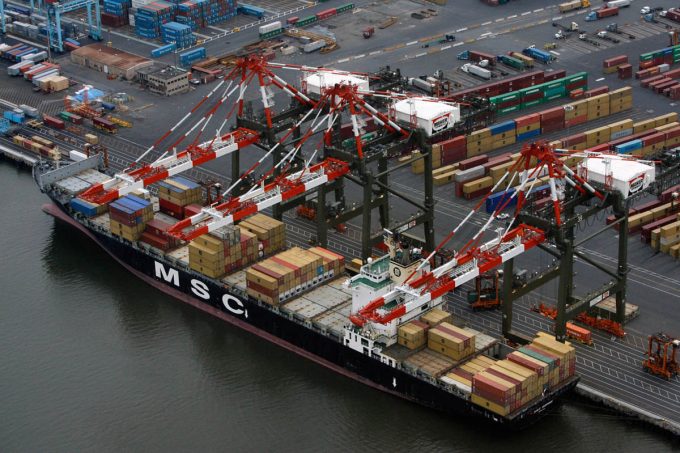East coast containership logjam builds as vessels steam in
As the ILA strike at US east and Gulf coast ports enters its second day, ...
DHL: ECOMM TIESKNIN: PARTNERSHIP EXTENSIONMAERSK: DECARB PUSHUPS: DIVIDEND RISKXOM: UPDATEVW: MILESTONE LINE: UNLIKEDXOM: DRILL BABY DRILLMAERSK: GREEN PUSHGM: BIG HITAMZN: STRIKEZIM: EXIT STAGE LEFTDSV: ZERO US TARIFFS IMPACT XPO: LOOKING GOODAMZN: PARTNERSHIP EXTENDED
DHL: ECOMM TIESKNIN: PARTNERSHIP EXTENSIONMAERSK: DECARB PUSHUPS: DIVIDEND RISKXOM: UPDATEVW: MILESTONE LINE: UNLIKEDXOM: DRILL BABY DRILLMAERSK: GREEN PUSHGM: BIG HITAMZN: STRIKEZIM: EXIT STAGE LEFTDSV: ZERO US TARIFFS IMPACT XPO: LOOKING GOODAMZN: PARTNERSHIP EXTENDED

As anticipated, US container imports in February were massively down from the highs of the previous year, with US west coast ports in particular suffering a huge 37% drop.
According to the McCown report, which covers the top ten US container ports, import throughput last month fell a record 28%, to 1,454,438 teu, the lowest level since March 2020, as extremely weak demand was exacerbated by the Chinese New Year falling ten days earlier than last year.
Meanwhile, imports at US east and Gulf coast ports declined 18.7%, to 809,375 teu, with only the port of Houston recording an increase, 12.7% year on year, to 141,946 teu.
The west coast ports were also impacted by the continued coastal shift to the east and the unresolved west coast labour situation. The port of Los Angeles saw a startling 41.2% collapse in container imports, to 249,407 teu, demoting it to third in the import rankings behind New York/New Jersey, with 280,652 teu, and San Pedro Bay neighbour Long Beach’s 254,970 teu.
During a cargo news briefing on Friday, LA’s executive director, Gene Seroka, said vessel calls in February were down to 61, compared with 93 in the same month of last year, and no fewer than 30 blanked sailings in the month.
“The demand is just not there,” he said.
“US warehouses remain largely full, retailers must clear inventory levels before the next wave of imports arrive, but with the economy on everybody’s mind and consumers continuing to feel the pinch of inflation, older inventories are simply not moving fast enough.”
All this, he added, amid reports in the US media of retailers deciding to destroy stock they could not shift even with heavy discounting.
Mr Seroka said that while he expected March volumes to be better, throughput would be around a third down, quarter on quarter, and would remain “lighter than average in the first half of 2023”.
Indeed, McCown report three-month data is now showing a 21% decline in import volumes, a further decrease on the 17.2% negative of last month.
And there was further evidence of the global slowdown in the big drop in empty equipment being shipped back to Asia, with the port of Los Angeles processing 156,035 teu for export during the month, versus 338,251 teu the previous year.
Nevertheless, Mr Seroka said, there was some reason for optimism from its close monitoring of purchase orders – which he explained typically convert to shipments from Asia 90 to 100 days later.
“We are starting to see a little bit of an uptick in the middle of the year,” he said.
Meanwhile, US exports continued their recent gains, recording an overall 4.6% increase to 789,037 teu in February, for a trailing three-month gain of 8.7%.
According to the McCown report, the ports with the strongest export performance in February were Houston, up 41.7% to 116,265 teu, Charleston, up 12.2% to 61,448 teu, and Norfolk, up 8.8% to 96,399 teu.
Los Angeles was the weakest, with a loss of 13.7%, to 82,404 teu, followed by Oakland, with a drop of 9.4%, to 56,475 teu.
Comment on this article